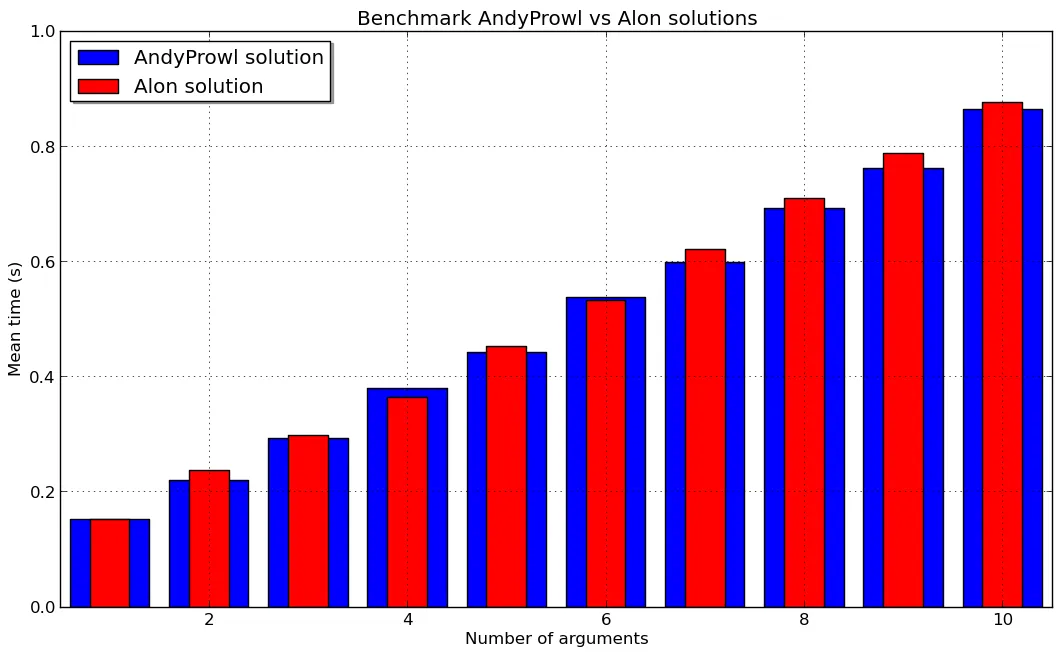随着辩论在比较AndyProwl和Alon解决方案时的演变,我对两种解决方案进行了基准测试,结果...取决于参数的数量。
编译方式:
g++-4.7 -std=c++11 -Wall -Wextra -O3 main.cpp -o main -D_FIRST
对AndyProwl的解决方案进行基准测试,并使用以下编译:
g++-4.7 -std=c++11 -Wall -Wextra -O3 main.cpp -o main -D_SECOND
对Alon解法进行基准测试。
这是10个参数的基准测试程序。
#include <iostream>
#include <chrono>
template <typename Type>
inline bool f1(const Type& arg)
{
return arg;
}
template <typename Type, typename... Types>
inline bool f1(const Type& arg, const Types&... args)
{
bool arg1 = f1(arg);
bool arg2 = f1(args...);
return arg1 && arg2;
}
template <typename Type>
inline bool f2(const Type& arg)
{
return arg;
}
template <typename Type, typename... Types>
inline bool f2(const Type& arg, const Types&... args)
{
return f2(arg) & f2(args...);
}
int main(int argc, char* argv[])
{
static const unsigned long long int primes[10] = {11, 13, 17, 19, 23, 29, 31, 37, 41, 43};
static const unsigned long long int nbenchs = 50;
static const unsigned long long int ntests = 10000000;
unsigned long long int sum = 0;
double result = 0;
double mean = 0;
std::chrono::high_resolution_clock::time_point t0 = std::chrono::high_resolution_clock::now();
for (unsigned long long int ibench = 0; ibench < nbenchs; ++ibench) {
t0 = std::chrono::high_resolution_clock::now();
sum = 0;
for (unsigned long long int itest = 1; itest <= ntests; ++itest) {
#ifdef _FIRST
sum += f1((itest+sum)%primes[0], (itest+sum)%primes[1], (itest+sum)%primes[2], (itest+sum)%primes[3], (itest+sum)%primes[4], (itest+sum)%primes[5], (itest+sum)%primes[6], (itest+sum)%primes[7], (itest+sum)%primes[8], (itest+sum)%primes[9]);
#endif
#ifdef _SECOND
sum += f2((itest+sum)%primes[0], (itest+sum)%primes[1], (itest+sum)%primes[2], (itest+sum)%primes[3], (itest+sum)%primes[4], (itest+sum)%primes[5], (itest+sum)%primes[6], (itest+sum)%primes[7], (itest+sum)%primes[8], (itest+sum)%primes[9]);
#endif
}
result = std::chrono::duration_cast<std::chrono::duration<double>>(std::chrono::high_resolution_clock::now()-t0).count();
mean += result;
std::cout<<"time = "<<result<<" (sum = "<<sum<<")"<<std::endl;
}
std::cout<<"mean time = "<<mean/nbenchs<<std::endl;
return 0;
}
对于每个给定数量参数的解决方案,我们有50个基准测试,离散度非常小,并且这些基准测试的平均时间是一个可靠的指标。
我的第一个基准测试是使用“正确”数量的参数,其中Alon的解决方案比AndyProwl的解决方案快。
最终结果在此处:

因此,AndyProwl的解决方案通常比Alon的更快。现在我可以验证您的答案。但我认为差异非常小,取决于架构/编译器。
所以:
- AndyProwl+1 是您一般较快的解决方案
- Alon+1 是您支持constexpr的解决方案

&替换&&怎么样? - fredoverflow